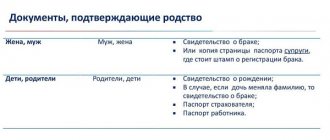Many married couples, despite their wishes, remain childless. There are also mothers who, for various reasons, are not able to raise their own child. The child ends up in an orphanage. The development of children outside the family causes them great moral trauma. It is difficult for a grown-up orphanage resident to find a place in life.
It happens that couples who are unable to bear children wish to adopt a child rejected by the biological parents. This is not easy to do for a number of reasons. Bureaucratic red tape, imperfect legislation, and ignorance of candidates for guardians interfere. How, in this case, can one become a guardian of a child from an orphanage, in accordance with the legislation of the Russian Federation?
There are three levels of fostering children: adoption, guardianship and guardianship.
Making a decision to adopt a child from an orphanage
Before making a decision about guardianship, you should make sure there is a strong desire. No one can be forced to take on such responsibility. You need to calculate your capabilities. The child needs to be fed, clothed, educated and provided with decent living conditions.
Guardianship is a special form of child protection. It is valid until the ward’s 14th birthday. If a guardian intends to raise a young person until his 18th birthday, he formalizes guardianship.
Guardianship and custody of a child is a serious decision. If a married couple does not become full parents, they accept the obligation to educate, protect the ward and provide assistance.
What is adoption
Adoption is one of the most important institutions of family law. Adoption is the definition of a legal act as a result of which children deprived of parental care can find a new family. The main feature of this process is that as a result, legal ties arise between adopted children and adoptive parents, similar to the relationship between parents and children. That is, as a result, the parties become close relatives.
The concept and meaning of adoption are not defined by law, however, Art. 124 of the IC defines it as a priority form of family placement for orphans. This is due to the fact that not only close family relationships arise between adoptive parents and adoptees, but also legal ties that equate such a child to a blood child and give adoptive parents full rights and responsibilities of parents.
It should be understood that such adoption makes a child a full-fledged member of the family, giving him inheritance rights in relation to new parents and other relatives. The adoptive parents, in turn, are given the right to give the child their own surname, as well as change his other personal data at their discretion.
Legislative regulation
The main legislative act regulating adoption in family law is, of course, the Family Code. Its regulations determine the main points of this procedure, the requirements, rights and obligations of adoptive parents and adopted children, the general rules of adoption, the consequences of its implementation, conditions for cancellation, and so on.
However, the adoption procedure is regulated not only by family law - for example, Chapter 29 of the Civil Procedure Code provides legal regulation of adoption as a special judicial proceeding, determining the procedure for judicial review, the content of the application, and the necessary documents. Separate standards are also contained in other legislative acts: for example, the Civil Code of the Russian Federation establishes the rights of adopted children and adoptive parents in inheritance.
Where to contact
To start the procedure, you need to contact the local guardianship and trusteeship authority , authorized to resolve such problems. The institution is directly subordinate to the head of the district or settlement, who approves the decision made. The document issued by the administration is valid on the territory of the Russian Federation. Claims from the education department, which is involved in checking the documents to be provided, cannot be excluded. It should be recalled that an application for guardianship is required at the place of registration or residence of the child .
Application for child custody
1 file(s) 152.96 KB
Medical examination of a child
For each child, a report on the state of his health is submitted to the guardianship authority. But each candidate for adoptive parents has the right to their own medical examination of the child.
Children subject to adoption are examined under certain conditions:
- the examination must be carried out in licensed medical institutions;
- the medical worker of the institution from which the child is required to be present;
- The examination period should not exceed 30 days.
What documents are needed
- Statement of intent to become a guardian.
- Personal resume. The applicant fills out a form that includes passport data, information about place of residence, a diploma of education, a certificate from the administration of the labor institution about the specialty, the position performed, and a document certifying marital status. The applicant puts a date and personal signature under the resume.
- Salary certificate. An individual entrepreneur submits a photocopy of the tax return. The recipient of the pension must provide information about the pension fund.
- Photocopy of financial account.
- A document from a housing institution confirming the availability of personal property.
- A certificate from law enforcement authorities stating that the applicant has no criminal record under articles of the Criminal Code of the Russian Federation relating to attempted murder or injury to health.
- Medical certificate about physical and psychological health.
- A document confirming the marriage relationship.
- Written agreement of the spouse.
In addition to the above documents, authorities may require additional ones.
How can I find my biological parents if I am adopted?
Each person decides for himself whether to look for real parents or not. If he nevertheless decides to take such a step, then first he needs to talk with his adoptive parents and get their consent to this search.
Since there is serious responsibility for disclosing the secret of adoption, no government agency will provide information without the written permission of the adoptive parents. If they are already dead, this problem is removed.
Organizations that can help you find information:
- first you need to turn to the archives of the registry office, since it was this organization that issued a new birth certificate, instead of the old one that the child had before he was adopted. That is, the old document contains the child’s real, original data;
- the local administration can find an official adoption permit, which clearly states when and where the baby was taken into the family;
- If a person finds out that before adoption he was in an orphanage, then it is best to turn there for information about biological parents.
Sometimes situations arise in which a person who turns to official authorities for information about his adoption is refused. Then there is only one way out - to go to court. However, you need to be prepared for the fact that the process will be lengthy and you will have to spend money on the services of a lawyer.
As a last option, if all else fails, you can seek help from one of the television programs on searching for missing relatives. Perhaps this is what will bring real results and help a person find his real parents.
Social guarantees
Social guardianship provides the following rights:
- Choose your own educational methods.
- Count on the methodological assistance of guardianship institutions.
- Accept financial support for the child in accordance with this legislation.
- Refuse financial benefits.
Adult rights end when children reach adulthood or marry.
Cash benefits
In the Russian Federation, there are the following types of cash benefits for wards:
- One-time benefit. Paid when a child joins the family. An application for a subsidy and documents certifying the absence of parents are submitted within the first six months from the time guardianship is established at the guardian’s place of residence. The amount of money is calculated according to the regional index.
- Monthly allowance. To receive money, the guardian is obliged to submit the necessary documents to government agencies within 3 days from the time the benefit is issued. Local payments are assigned and adjusted by local administrations of settlements.
- Benefit for a ward who has the status of a disabled child. Payments are made to caregivers who are unemployed and have no source of income. Monthly care payments are 5,500 rubles.
Documents for receiving child benefit Until what age do you receive child benefit?
Rights of the trustee and guardian
Educators have the following rights:
- Raise the child at your own discretion, taking into account the requirements of the guardianship authorities and the absence of objections from the child being raised.
- Choose an educational institution, taking into account the wishes of the student in terms of form and specialization of education.
- Perform actions with the property of the person being raised in consultation with the guardianship authorities. Actions that worsen the financial situation of the pupil are prohibited.
Teachers have the following responsibilities:
- Ensure the child’s education and universal upbringing.
- Show concern. Be attentive to the student's requests.
- Provide a friendly psychological and emotional environment.
- Protect material and non-material guarantees of the rights of the child.
- Be legally responsible for actions that cause damage to the ward’s property.
- Do not interfere with contact between the child and biological parents.
Guardianship and custody of children is a responsible decision. If a married couple is not ready to become full-fledged parents, they accept obligations to educate and protect the rights of the ward.
Part one. How to take a child from an orphanage
Legislatively, the procedure for adopting children in Russia consists of five main steps:
- Come to the territorial Department of Guardianship and Trusteeship at your place of residence and write an application.
- Complete training at a foster parent school, which is conducted by training centers under the guardianship authorities. Training is compulsory and free. Here you will find many nuances on how to adopt a child from an orphanage.
- Collect the necessary documents. Their set depends on the chosen form of placing the child in a family. The list will be given to you by the guardianship department.
- Find your child.
- Register the child in your name.
Training at a foster parent school
Adopting children - where to start? From receiving information. The procedure for adopting a child from an orphanage and other information related to how to adopt a child from an orphanage can be found in special courses for adoptive parents.
The benefits of studying at a foster parent school cannot be overestimated. It does not oblige you to anything, and at the same time it reveals legal, general psychological, medical and other issues of adoptive parenthood. Students of the school get the opportunity to consider foster parenting from the inside in some detail. Understand what criteria and how to choose a child for adoption. Resolve my doubts: what if I take a child into care and fail?
The training is worth taking for anyone who is at least theoretically thinking about the topic of adopting a child. After training, you will either be confirmed in your desire to take a child, or you will understand that you shouldn’t do this yet - and that’s good! It is much worse when people understand this after they have already taken the child and return him to the orphanage. In this case, everyone experiences colossal trauma - both the failed parents and, most of all, the child. Before the introduction of foster care schools, the return rate for children was 50%. Now this figure is much lower. Training will help you figure out how firm and conscious your decision is to take your child from the orphanage.
Adoption of a child from an orphanage and other forms of family arrangement
The choice of the form of family placement for a child depends on your desires, capabilities and status of the child.
- Adoption of orphans: the child acquires all the rights of his own child - surname, heredity, etc. Adoption of a child is possible only if the child is an orphan, that is, has such an official status (when there are no parents or they are deprived of parental rights). Blood relatives after the adoption of a child do not have the right to communicate with him. Taking a child from an orphanage on this basis means being ready to fully accept him into the family - as if he were your own.
- Guardianship and trusteeship: The guardian becomes the legal representative of the child. He can receive a monthly child support allowance, which depends on the region and the child’s health condition. In addition to orphans, children whose parents are not deprived of parental rights, but cannot fulfill their parental responsibilities can also be taken into custody: in cases of serious illness and other reasons. The child is placed under guardianship for his maintenance, upbringing and education, and protection of his rights and interests. More information about how to become a guardian for a child from an orphanage can be found in the foster parent courses.
Guardianship is established for children under 14 years of age. Guardianship – from 14 to 18 years.
When registering guardianship, the child retains his last name, first name, patronymic, and the blood parents are not released from the obligation to participate in his maintenance. Guardianship authorities control the conditions of detention, upbringing and education of the child.
- Foster family: This is actually applying for a job as a “foster parent.” Adoptive parents have certain rights and responsibilities, which are controlled by the guardianship authorities. In this case, the child must have orphan status.
- Guest family or mentoring: the child spends part of his time with the family. For example, weekends. Often used as a transitional form when future parents want to get to know their child better. This form helps the child to go beyond the boundaries created by the educational institution system, to experience how a family lives: to gain skills in housekeeping and communication with adults and other children in the family circle. Mentors help children with treatment, provision and choice of clothing, career guidance, and advice on what to do in certain situations.
- Patronage: established over children without a specific status or if the child’s status does not allow him to be transferred for guardianship or adoption. Often used as a transitional form to guardianship and/or adoption of a child after the child receives the appropriate status. When a child is placed in foster care, he formally remains a child at the orphanage, but at the same time has the opportunity to be raised in a family. His new parents are trained by the foster care service and monitor the process of family placement and foster care.
- Family-type orphanage: usually created in the organizational and legal form of an educational institution. It differs in that it has more children than in foster families and the availability of benefits.
Differences in forms of family arrangement for children
Adoption of children, guardianship and guardianship, foster family - all these forms of family placement of children put forward certain requirements for adoptive parents.
Adoption of orphans or a form of foster family is possible only if the children's parents are deprived of parental rights. Patronage and guest family allow you to take children with any status.
Foster family and foster care imply restrictions on the rights of educators in relation to children. Foster care limits these rights a little more than a foster family, but the contract in the case of foster care is more flexible and educators can take on exactly the responsibility for the child that a particular person can bear.
The set of documents also differs. It is most extensive and complex in the case of adoption of children in Russia. The simplest one is for a guest family.
It is best to choose the form of family arrangement that suits you after studying at a school for foster parents.
Problems with adoption
Many potential adoptive parents are interested in the question of whether it is easy to adopt a child, although for most this question seems rhetorical. The procedure for accepting children from an orphanage into a family is associated with a complex of problems of both a legal and moral-psychological nature, so this process certainly cannot be called easy. Even a superficial study of the situation with adoption and the subsequent life of the adoptive family allows us to identify the characteristic problems of adopting children and divide them into several categories. Among them:
- Legal problems are usually associated with collecting the necessary package of documents, going through many bureaucratic procedures, obtaining an opinion from the guardianship authorities, and legal proceedings.
- Moral and psychological problems are associated with the adoptive parents exaggerating their strengths, non-acceptance of their decisions by loved ones, the inability to see their own child in the adopted child, public censure, fear of genetic inclinations, and uncertainty.
- Health problems: when adopting a child under 2 years of age, parents should take into account that there is a possibility that the child may develop congenital diseases and pathologies, as well as various types of mental and physical disorders.
- Problems with adaptation: according to psychologists, the older the adopted child, the more difficult it is for him to get used to the new environment and adoptive parents. But parents may experience exactly the same problems.
Of course, these are not all the problems that may arise for adoptive parents. We must remember that adoption is first and foremost a sacrifice.
Who can become an adoptive parent
Russian legislation pays close attention to the issues of adoption and guardianship. This was done so that as many citizens as possible could try themselves as parents. But only in such a way that the rights of children accepted into new families are not infringed. Therefore, today any adult citizen of the Russian Federation who meets the requirements prescribed in the Family Code can become a foster parent.
Who cannot obtain the right to adoption
- Minors.
- People who are unable to exercise their parental rights due to health reasons.
- Persons recognized as partially or completely incompetent. This applies to both single adoptive parents and couples where one of the spouses has lost legal capacity (in the case of joint adoption).
- Those who do not have a permanent place of residence, or whose housing does not meet the requirements of SanPiN.
- Parents whose parental rights have been limited or deprived by a court order.
- Persons who have a criminal record under Art. 15, 16, 17, 18, 20, 24, 25 or 34 of the Criminal Code of the Russian Federation. Moreover, it does not matter whether the criminal record is expunged or not. An exception is the situations described in Art. 18 Code of Criminal Procedure of the Russian Federation.
- Adoptive parents, trustees and guardians who were previously relieved of their duties due to improper performance.
- People who do not have a stable income and are unable to provide their child with at least the subsistence minimum established by the subject of the Federation. In some cases (for example, when the applicant is a relative of the child), the court has the right to deviate from this provision. But only if it benefits the interests of the baby.
- Candidates who have not completed a foster parent training course. This clause does not apply to close relatives of the child.
- Persons in homosexual relationships, regardless of whether their relationship is unofficial or registered as a marriage in the territory of another state.
- Persons who are not official spouses (for situations where two people want to adopt one child at once).
- Adoptive parents whose age difference with the child is less than 16 years (optional, at the discretion of the court).
Adoption of a child by a single woman
In Russia, there is a widespread belief that only a full-fledged family of two people can adopt a child from an orphanage. Because of this, many women who are not in official relationships deny themselves the happiness of becoming a mother. However, the law (Article 127 of the Family Code of the Russian Federation) clearly states that both couples and single people have equal rights when adopting. If the baby’s rights are not infringed, and the woman meets the requirements of the law, she has every right to become his new mother.
At what age can you take a child from an orphanage?
Many people are looking to adopt a healthy infant. However, the last word always remains with the organization of orphans where they are in their care. If the child already knows how to write, then the process of transfer to a new family occurs only with his written consent. If he does not yet know how to hold a pen, his wishes can be voiced by a psychologist or social teacher. The exception is those cases when the child’s wishes conflict with his interests. In such situations, employees act at their own discretion.
Legal consequences of adoption
The legal consequences of adoption are enshrined in Art. 137 of the Family Code, according to which adopted children and their offspring in relation to adoptive parents and their relatives and vice versa acquire mutual property and non-property rights and obligations established by law in relation to blood relatives. In fact, they become close relatives with all the ensuing consequences.
This applies not only to personal and property rights and obligations established by family law, but also established by other branches of law - civil, labor, pension, inheritance.
According to Part 3 of Art. 125 of the Family Code, the rights and obligations of the adoptive parent and adopted child arise from the day when the corresponding court decision takes legal force. It is important to understand that, according to Part 6 of Art. 137 of the Family Code, such consequences occur regardless of whether the adoptive parents are registered as the child’s parents or not.
Rights and responsibilities of adopted children
According to the general rule established by Part 2 of Art. 137 of the Family Code, upon entering a foster family, a child loses any rights and obligations in relation to his biological parents, acquiring a similar amount of rights in relation to members of the foster family. Moreover, if the adoptive parent is one person, at the request of the biological mother or father, such rights and obligations can be preserved if the adoptive parent is a man or a woman, respectively.
In addition, in some cases, such rights and obligations may be preserved in relation to biological grandparents, as indicated in the court decision.
In addition, according to Art. 138 of the Family Code, an adopted child may retain the rights to a pension or benefit, the reason for which was the death of a biological parent.
It is worth noting that after adoption and the acquisition of the scope of rights in relation to adoptive parents, it necessarily includes inheritance, housing and other property rights guaranteed to blood relatives, as well as the rights established by Chapter 11 of the Family Code. As for responsibilities, they arise only upon reaching adulthood: including the obligation to support and participate in additional expenses of needy parents.
Rights and responsibilities of adoptive parents
As has already been determined, family legal relations between the adoptive parents and the adopted child arise from the moment the court decision enters into force. From this day forward, adoptive parents have all the responsibilities regulated by Chapter 12 of the Family Code, including:
- financial support of the child;
- ensuring his right to education, housing and other fundamental rights;
- full-fledged education of the child;
- protection of his rights and legitimate interests;
- caring for physical, mental, moral and spiritual development.
As for the rights of adoptive parents, they are identical to the rights of blood parents: until the child reaches the age of majority, adoptive parents serve as his legal representatives, after which they retain all the property rights of close relatives.








